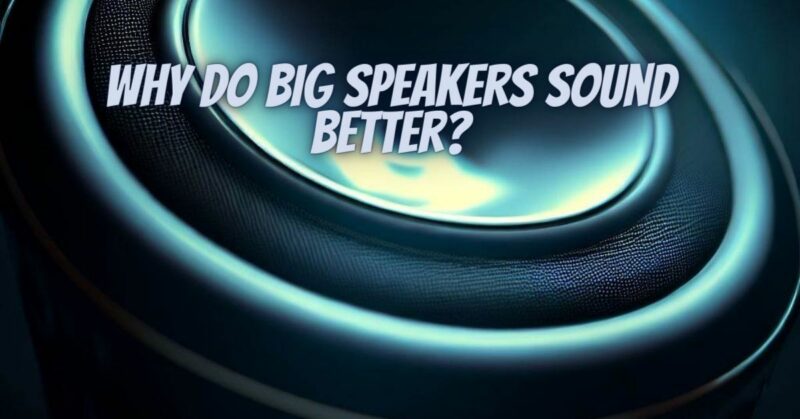When it comes to audio quality, size often matters. Big speakers, with their imposing presence and powerful sound, have long been associated with superior audio performance. But why exactly do big speakers sound better? Is it a mere coincidence, or is there a scientific basis behind this perception? In this article, we’ll delve into the world of audio technology to understand the factors that contribute to the impressive sound quality of big speakers.
- Enhanced Bass Response
One of the most noticeable advantages of big speakers is their ability to produce deep and resonant bass. This is primarily due to the larger size of the speaker cones and cabinets. Bigger speakers can move more air, which allows them to generate lower frequencies with greater authority and precision. The larger surface area of the speaker cone creates more substantial air displacement, resulting in the rich and immersive bass tones that are often lacking in smaller speakers.
- Reduced Distortion
Distortion is the enemy of high-quality audio. When speakers are pushed to their limits, they tend to produce distortion, which can degrade the listening experience. Big speakers, with their larger drivers and cabinets, have a higher power-handling capacity. This means they can handle more significant audio signals without distortion, even at higher volumes. As a result, music played through big speakers tends to sound cleaner and more faithful to the original recording.
- Improved Efficiency
Efficiency is a critical factor in determining the overall sound quality of speakers. Big speakers are inherently more efficient than their smaller counterparts. This efficiency is partly due to their larger diaphragms, which require less energy to produce the same sound pressure level as smaller speakers. As a result, big speakers can deliver more volume with less power, which can lead to a more dynamic and impactful listening experience.
- Greater Soundstage and Imaging
Soundstage refers to the perceived three-dimensional space in which the sound appears to be coming from. Big speakers, with their larger drivers and cabinets, have the capacity to create a more expansive and realistic soundstage. This means that when you listen to music through big speakers, you can often pinpoint the exact location of instruments and voices within the audio mix. This enhanced imaging capability contributes to a more immersive and enjoyable listening experience.
- Enhanced Dynamic Range
Dynamic range is the difference between the softest and loudest sounds in a piece of music. Big speakers are known for their ability to reproduce a wide dynamic range accurately. This means they can handle the quietest whispers and the loudest crescendos with precision. The result is a more emotionally engaging and lifelike rendition of music and audio content.
- Room-Filling Sound
Big speakers are particularly well-suited for larger rooms or spaces. Their size and power allow them to fill a room with sound, ensuring that every corner of the space is enveloped in music. This is especially important for home theaters, live performances, and other applications where a powerful and immersive audio experience is desired.
The perception that big speakers sound better is not just a matter of opinion; it’s grounded in the science of audio technology. The larger size of big speakers allows them to excel in critical areas such as bass response, reduced distortion, efficiency, soundstage, and dynamic range. While smaller speakers certainly have their place, for those seeking the ultimate audio experience, big speakers remain a popular choice. So, whether you’re an audiophile, a music enthusiast, or someone who simply appreciates high-quality sound, investing in big speakers can bring your audio experience to a whole new level.

